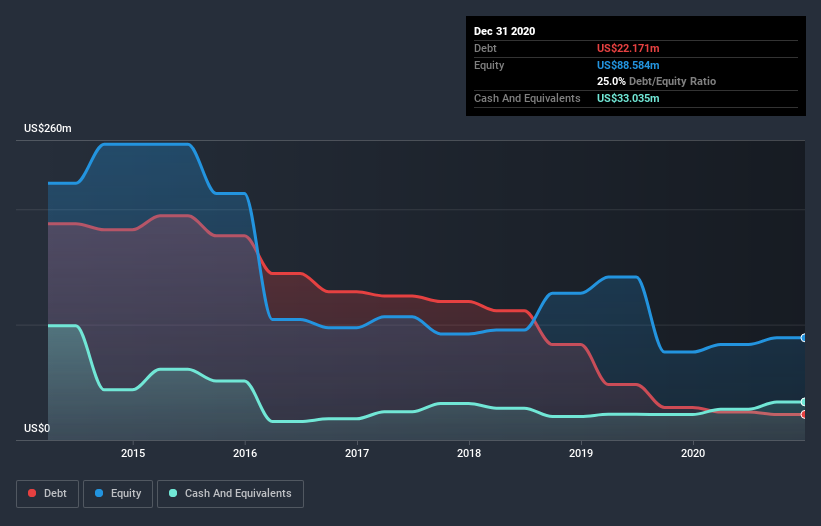David Iben put it well when he said, 'Volatility is not a risk we care about. What we care about is avoiding the permanent loss of capital.' When we think about how risky a company is, we always like to look at its use of debt, since debt overload can lead to ruin. As with many other companies Horizon Oil Limited (ASX:HZN) makes use of debt. But the more important question is: how much risk is that debt creating?
Why Does Debt Bring Risk?
Debt and other liabilities become risky for a business when it cannot easily fulfill those obligations, either with free cash flow or by raising capital at an attractive price. In the worst case scenario, a company can go bankrupt if it cannot pay its creditors. However, a more usual (but still expensive) situation is where a company must dilute shareholders at a cheap share price simply to get debt under control. Of course, debt can be an important tool in businesses, particularly capital heavy businesses. When we examine debt levels, we first consider both cash and debt levels, together.
Check out our latest analysis for Horizon Oil
What Is Horizon Oil's Debt?
The image below, which you can click on for greater detail, shows that Horizon Oil had debt of US$22.2m at the end of December 2020, a reduction from US$28.2m over a year. But on the other hand it also has US$33.0m in cash, leading to a US$10.9m net cash position.

A Look At Horizon Oil's Liabilities
Zooming in on the latest balance sheet data, we can see that Horizon Oil had liabilities of US$32.1m due within 12 months and liabilities of US$51.3m due beyond that. Offsetting these obligations, it had cash of US$33.0m as well as receivables valued at US$10.1m due within 12 months. So its liabilities outweigh the sum of its cash and (near-term) receivables by US$40.3m.
While this might seem like a lot, it is not so bad since Horizon Oil has a market capitalization of US$92.3m, and so it could probably strengthen its balance sheet by raising capital if it needed to. However, it is still worthwhile taking a close look at its ability to pay off debt. Despite its noteworthy liabilities, Horizon Oil boasts net cash, so it's fair to say it does not have a heavy debt load! The balance sheet is clearly the area to focus on when you are analysing debt. But it is Horizon Oil's earnings that will influence how the balance sheet holds up in the future. So if you're keen to discover more about its earnings, it might be worth checking out this graph of its long term earnings trend.
Over 12 months, Horizon Oil made a loss at the EBIT level, and saw its revenue drop to US$58m, which is a fall of 48%. That makes us nervous, to say the least.
So How Risky Is Horizon Oil?
While Horizon Oil lost money on an earnings before interest and tax (EBIT) level, it actually generated positive free cash flow US$14m. So taking that on face value, and considering the net cash situation, we don't think that the stock is too risky in the near term. Until we see some positive EBIT, we're a bit cautious of the stock, not least because of the rather modest revenue growth. The balance sheet is clearly the area to focus on when you are analysing debt. But ultimately, every company can contain risks that exist outside of the balance sheet. For instance, we've identified 2 warning signs for Horizon Oil that you should be aware of.
If you're interested in investing in businesses that can grow profits without the burden of debt, then check out this free list of growing businesses that have net cash on the balance sheet.
If you’re looking to trade Horizon Oil, open an account with the lowest-cost* platform trusted by professionals, Interactive Brokers. Their clients from over 200 countries and territories trade stocks, options, futures, forex, bonds and funds worldwide from a single integrated account. Promoted
Valuation is complex, but we're here to simplify it.
Discover if Horizon Oil might be undervalued or overvalued with our detailed analysis, featuring fair value estimates, potential risks, dividends, insider trades, and its financial condition.
Access Free AnalysisThis article by Simply Wall St is general in nature. It does not constitute a recommendation to buy or sell any stock, and does not take account of your objectives, or your financial situation. We aim to bring you long-term focused analysis driven by fundamental data. Note that our analysis may not factor in the latest price-sensitive company announcements or qualitative material. Simply Wall St has no position in any stocks mentioned.
*Interactive Brokers Rated Lowest Cost Broker by StockBrokers.com Annual Online Review 2020
Have feedback on this article? Concerned about the content? Get in touch with us directly. Alternatively, email editorial-team (at) simplywallst.com.
About ASX:HZN
Horizon Oil
Engages in the exploration, development, and production of oil and gas properties in China, New Zealand, Australia, and Thailand.
Adequate balance sheet with questionable track record.
Similar Companies
Market Insights
Community Narratives





